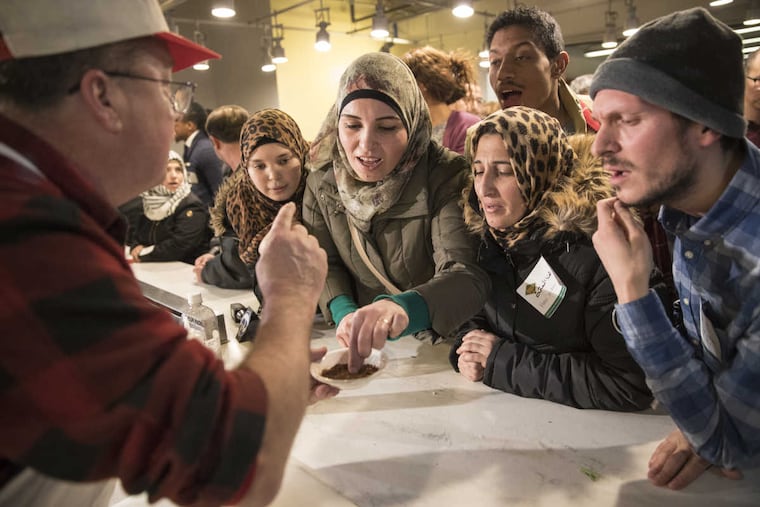Syrian refugees meet their Lower Northeast neighbors at Reading Terminal Market

The date had been on the calendar for months:
Two dozen Syrian refugees, recently resettled in Philadelphia's Lower Northeast, would meet Tuesday night in Reading Terminal Market with two dozen of their native-born American neighbors for a meal and discussion about the challenges of assimilation.
The meeting "was relevant even before" President Trump's executive order five days ago barring Syrian immigration to the United States, "and relevant on steroids now," said Terminal general manager Anuj Gupta.
"Our country is doing things that I could have never imagined. ... And for me this is personal. I am here because my ... grandmother had a chance to flee a war zone between India and Pakistan and come to a safe haven.
"I can't account for what leaders in Washington are saying. But to our newest friends," he said, "you are all welcome here."
The Syrian participants were chosen by two local resettlement agencies, HIAS Pennsylvania and Nationalities Service Center.
Pamela Baranackie, vice chair of the Lower Northeast community group Take Back Our Neighborhood, chose the long-term residents who attended.
She said she picked a cross-section of her neighborhood, which includes people born in Brazil, Africa, and the Caribbean, because "when it says on the Statue of Liberty, 'Give me your tired, your poor, your huddled masses,' you don't immediately think of a middle-aged white man."
Husband and wife Ahmad Moaddal and Khaldieh Al Ali arrived in Philadelphia four months ago and Tuesday night dropped by the table where Arabic-speaking Hesham Barouki, of Kamal's Middle East Market, was forming ground chickpeas into small balls to be fried for falafel. Al Ali and Barouki discussed technique.
In another corner set aside for the event, chef Jack McDavid of the Down Home Diner prepared blackened catfish.
McDavid said his ancestors were refugees from Ireland.
"We're all refugees," he said, "that's what made us great and will keep us great. The people of America have stood up to their government before, and will do it again."
Born and raised in Philadelphia, Julia Clayton of Castor Gardens, a retired university billing office employee, said she came out to see what she could do to help welcome her new foreign-born neighbors.
The forum that brought these new neighbors together, "Breaking Bread, Breaking Barriers: Food as a bridge to cultural understanding," was inspired in part by the book The Cosmopolitan Canopy: Race and Civility in Everyday Life by sociologist Elijah Anderson.
The "canopy," said Gupta, is Anderson's metaphor for the Terminal, where food is a common denominator that stimulates interactions between strangers of completely different backgrounds.
Gupta drew on that concept in his successful pitch for approximately $80,000 in Knight Foundation grant funding.
The money will pay for six two-part forums. Residents meet at the first part and come back about six months -- hopefully better acquainted -- to cook a meal together during the second part.
"Our cuisines don't just represent a tablespoon of this and a cup of that," said Gupta. "Our cuisines represent our history, culture, values."
Mediated through interpreters, communication Tuesday was a bit cumbersome. But shared smiles spoke volumes.
Of the states that have resettled Syrian refugees, Pennsylvania was third in fiscal 2015 with 102, preceded by Michigan (166), and California (122).
According to the Migration Policy Institute, a Washington research center that publishes data on immigration, more than 11 million Syrians have been displaced -- internally and externally -- by Syria's six-year-old civil war. Of them, about 18,000 were resettled in the U.S. between Oct. 1, 2011, and Dec. 31, 2016.
Trump's executive order put a stop to that.
Radwan Mahmoud, 50, came to Philadelphia with his wife and two children six months ago, and works as a bilingual counselor in the School District of Philadelphia.
"In my country we experienced the worst dictatorship," he said. "So I'm not worried in America."
The president here has a four-year term or two, said Mahmoud. "There is an end. ... He cannot go further."